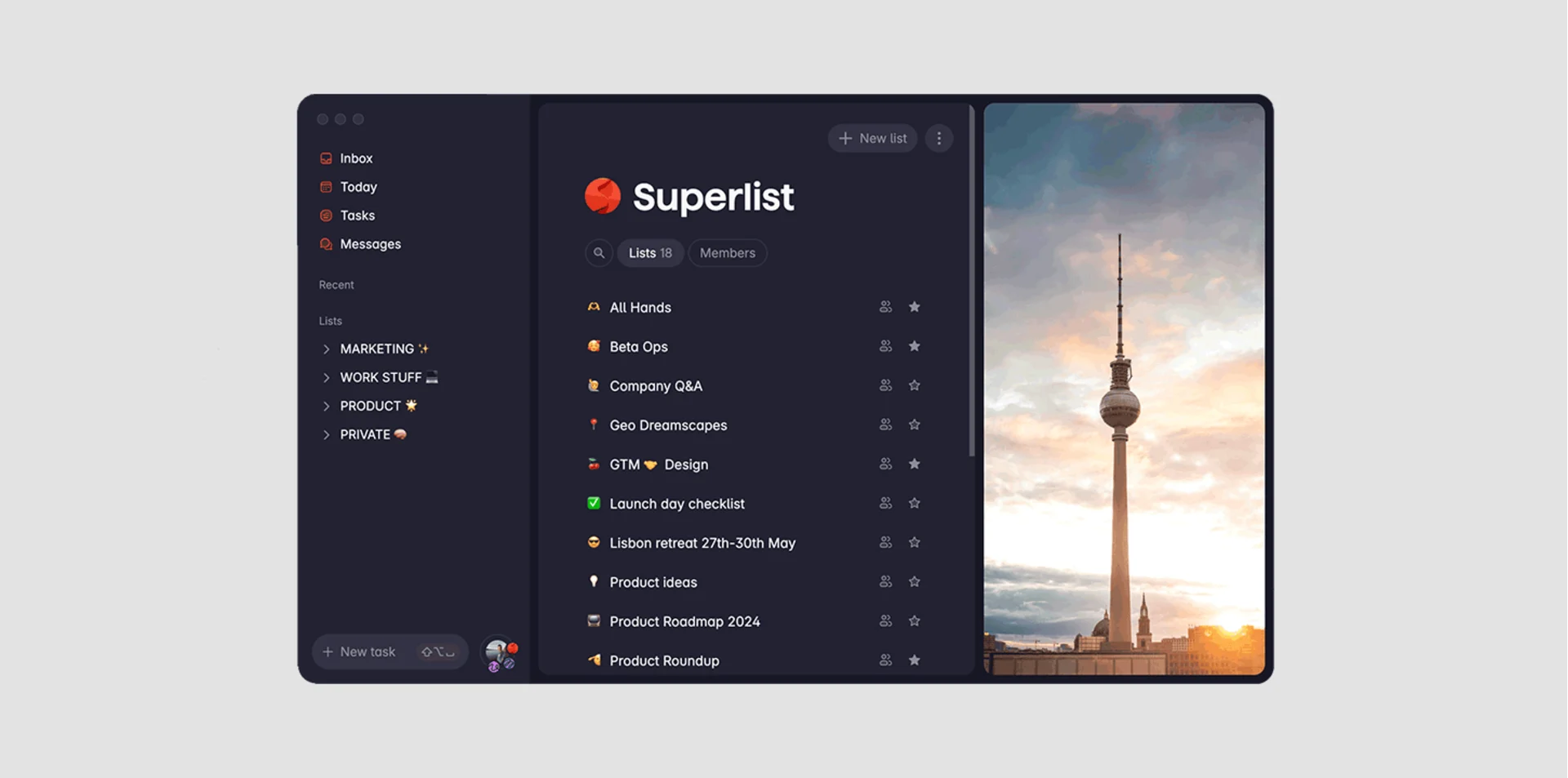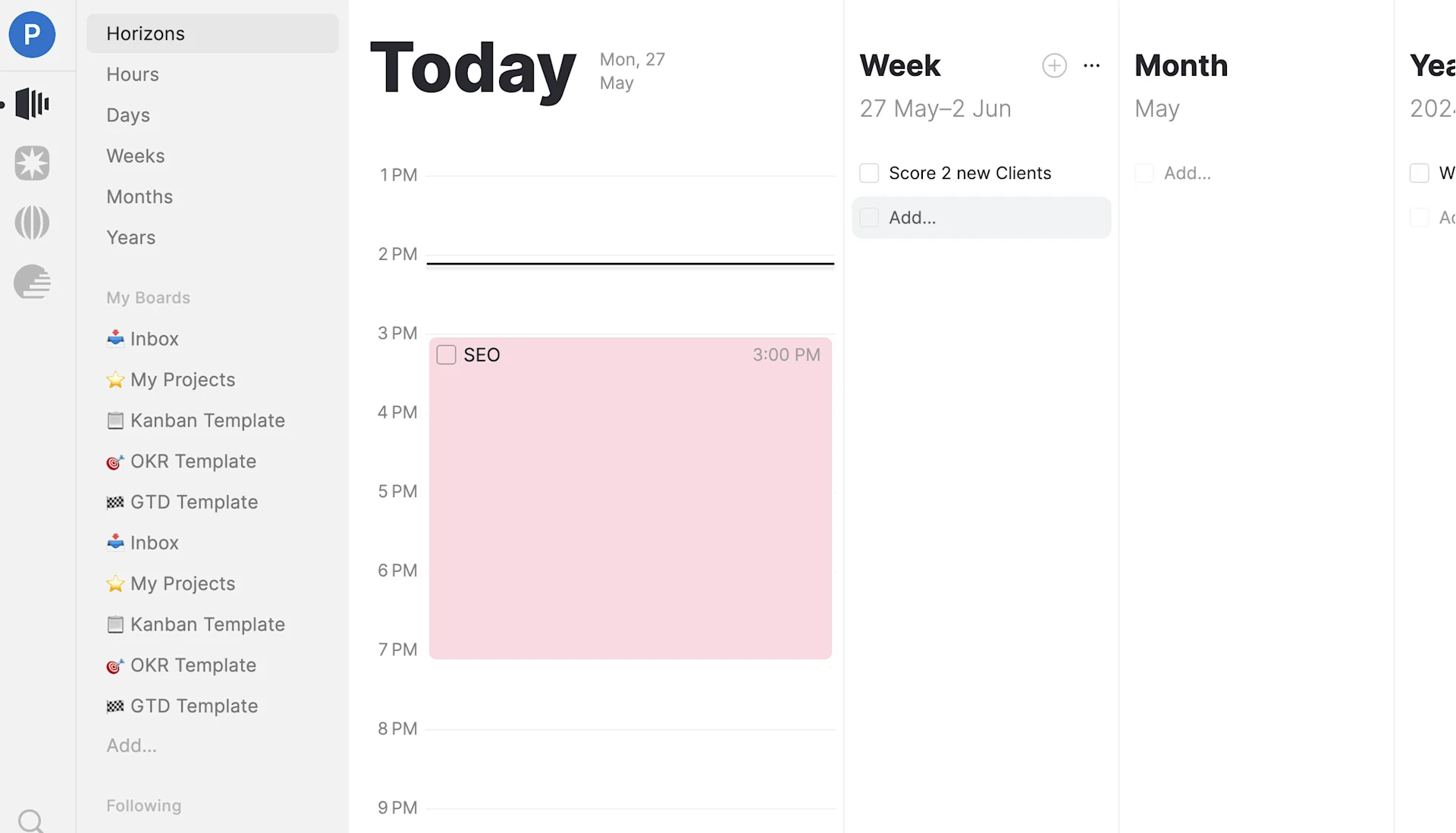Best 10 Motion Alternatives & Competitors in 2025
10th Jan, 2025
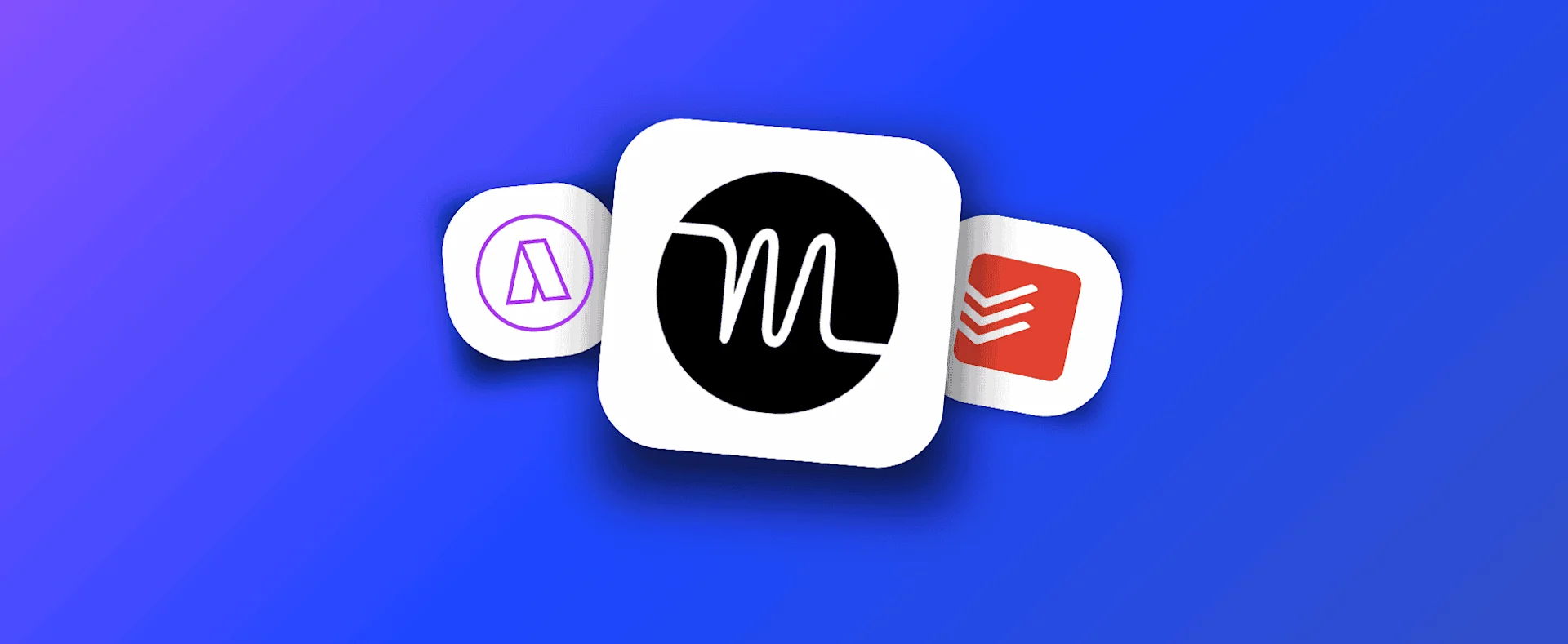
Motion is used to plan your day ahead. Many people are seeking out the best Motion replacements for a variety of reasons so here are the best Motion-like apps for managing your day ahead.
Are you hunting for Motion alternatives?
Motion is one of the most popular daily planning apps on the market.
Many people use it every single day to get more done by using the AI rescheduling, project management, and calendar capabilities to connect with Google Calendar. But you're seeking an alternative to Motion to help you plan your day.
Apps like Motion need to be robust, cost-effective, and help you schedule your day with tasks and calendars. Maybe the expensive nature of Motion was a factor, or perhaps you didn't get on with it, so let's find you the best Motion alternative.
List of Motion Alternatives
Let's explore the best options that allow you to manage your daily routine and better help take the weight out of co-ordinating what tasks to do next:
Alternatives | Best Features |
|---|---|
Bringing tasks in from other apps | |
Tools for mindful task management | |
Powerful calendar AI abilities | |
Brilliant macOS app for capturing tasks | |
Works well for project management | |
Great real-time task collaboration | |
Ability to plan tasks and use views | |
Perfect for goal planning | |
Connects with task apps & calendar | |
Timeline view for visualizing tasks |
TLDR: Quick Summary
- Motion combines AI and daily planning in one.
- Many tools are competing with Motion for planning tasks.
- Motion not only works for individuals but teams too for planning projects
- The best Motion alternatives are Akiflow, Sunsama & Reclaim AI.
- There are an additional 7 alternatives to consider.
Can you use Motion for free?
Motion app is free for 14 days, but after this free trial, Motion costs $19 per month (billed annually) for an active subscription.
What are the best Motion alternatives?
The best Motion alternatives and closest competitors are Akiflow, Sunsama & Reclaim AI. All of these tools most resemble the features that are within Motion.
Is there an app better than Motion?
Motion has some powerful AI features and there are tools like Reclaim AI and Sunsama that have AI features that are rivaling the likes of Motion for better day scheduling for your tasks and meetings.
Recommendation
Akiflow
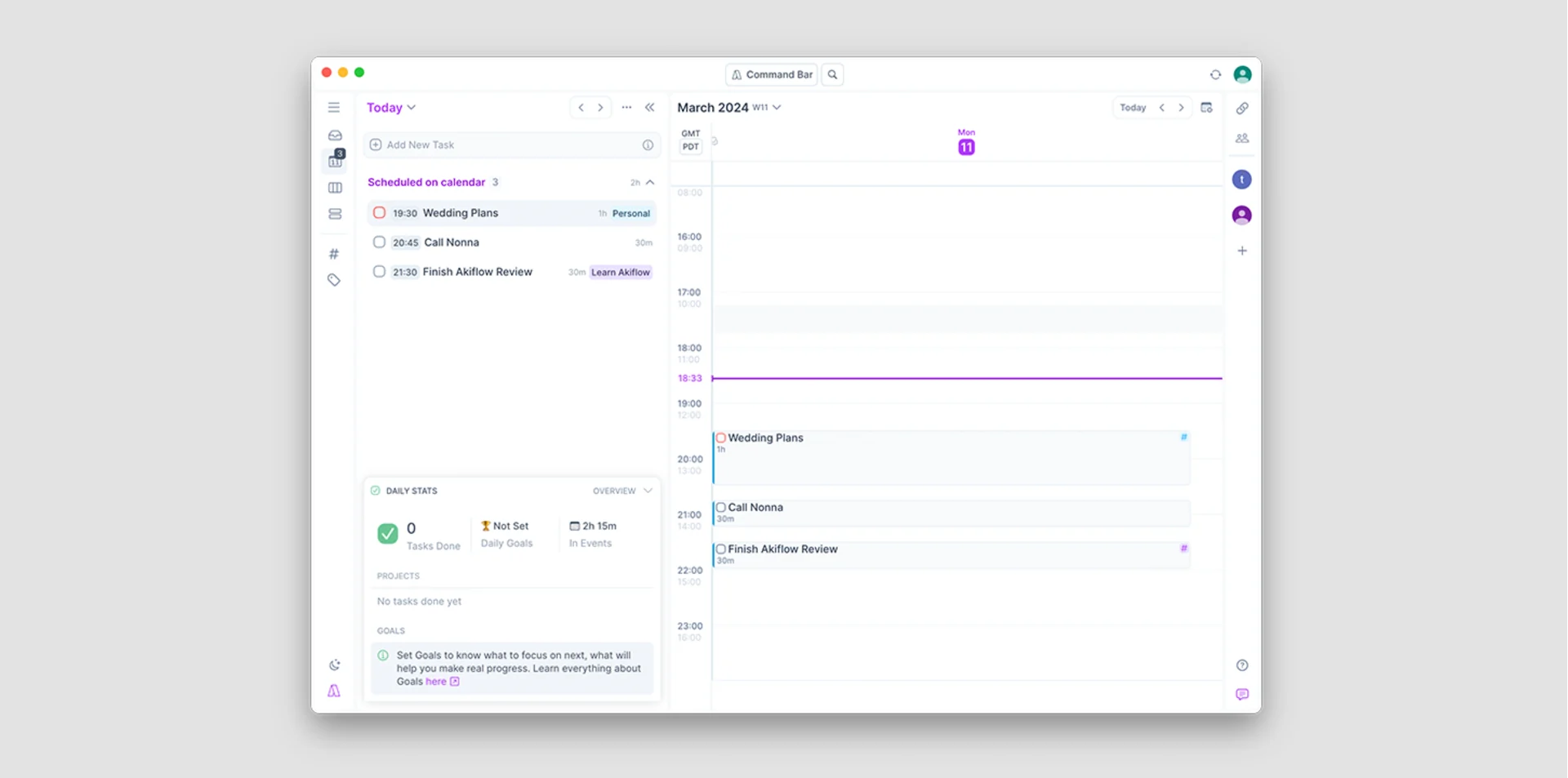
Quick Facts
- A daily planner app for busy professionals.
- Popular with freelancers, business owners & individuals.
- People use Akiflow to help plan their week and tasks.
What is Akiflow?
Akiflow is task management software combining tasks, calendars, and task consolidation by bringing tasks from apps like ClickUp, Notion, and Gmail. It is available on macOS, Windows, iOS, and Android. Akiflow is also known as a daily planner application.
Akiflow is used by freelancers, busy professionals, and those who want more than task management apps. It is well-known for managing tasks and calendars in one and comes in a similar market to apps like Motion & Sunsama.
Is Akiflow a good Motion alternative?
Akiflow is one of the popular daily planner apps for managing tasks & calendars.
As a Motion alternative, Akiflow is a good alternative as it allows you to see a calendar, plan meetings with scheduling links, comes with task management in some views, and allows you to plan tasks using time-blocking methods.
Motion excels with their AI which Akiflow doesn't have, but Akiflow does have the ability to bring in tasks and use guided planning called Rituals which will help you plan the next day.
What is the difference between Akiflow and Motion?
The key differences are that Akiflow focuses on task consolidation, and Motion focuses on AI planning. Task consolidation in Akiflow allows you to bring tasks from other apps like ClickUp, Notion, Gmail & Slack inside your inbox list, perfect for managing tasks in one.
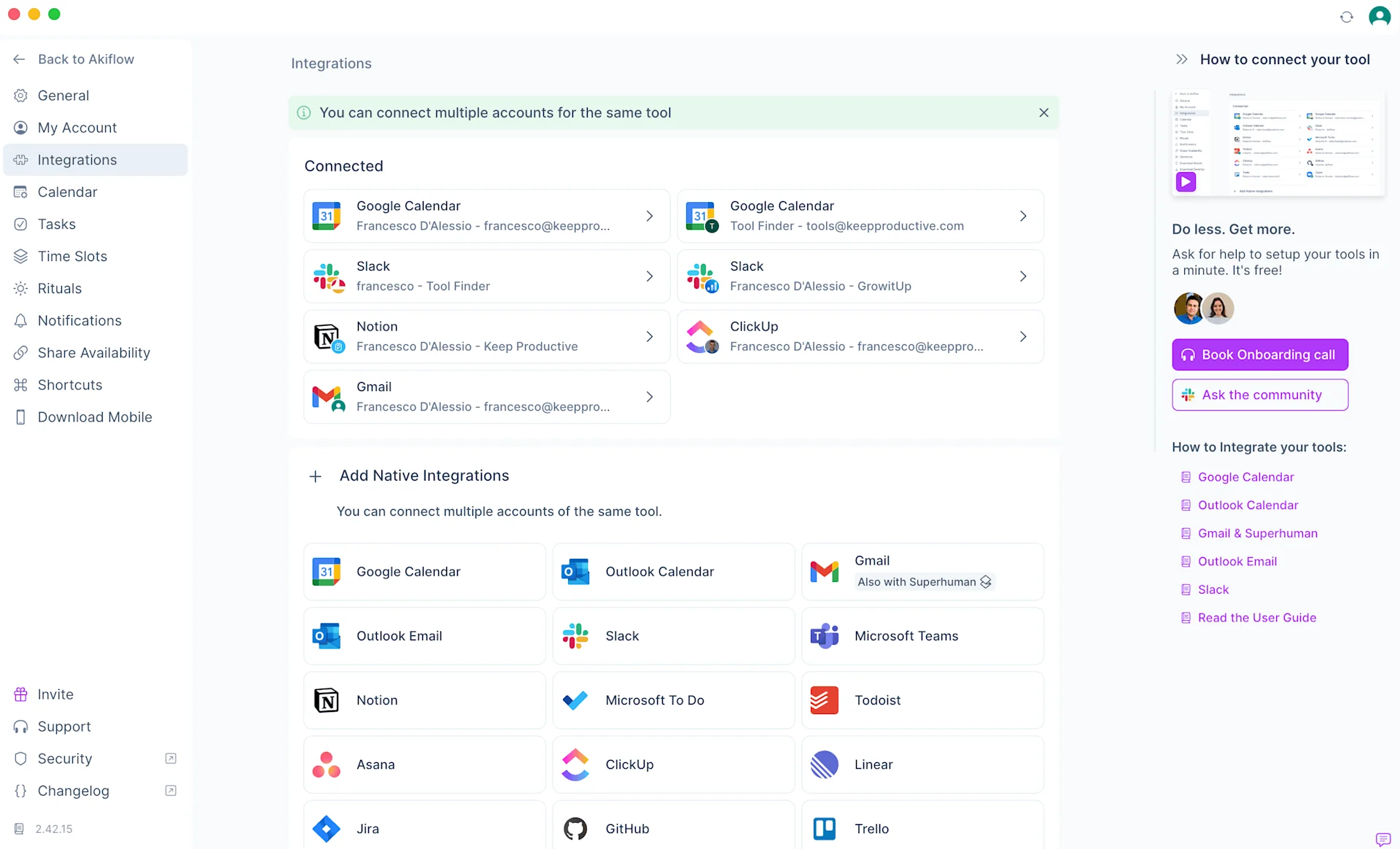
Alternatively, Motion uses AI to help schedule your tasks for you, like an AI assistant.
Should I get Akiflow to replace Motion?
If you're looking for something that will bring in tasks from other apps and are not as interested in Motion's AI abilities, Akiflow is a good alternative. If you're price-sensitive, Akiflow is the same price as Motion. It is worth exploring Akiflow alternatives if you like but want to expand your search further.
How much does Akiflow cost per month?
Akiflow costs $19 monthly, with a free seven-day trial if billed annually.
Plans | Pricing |
|---|---|
Solo Monthly | $34 per month |
Solo Annually | $19 per month |
Teams Monthly | $20 per month |
Teams Annual | $12 per month |
Is Akiflow free?
Akiflow comes with a 7-day free trial and no free pricing plan.
Recommendation
Sunsama
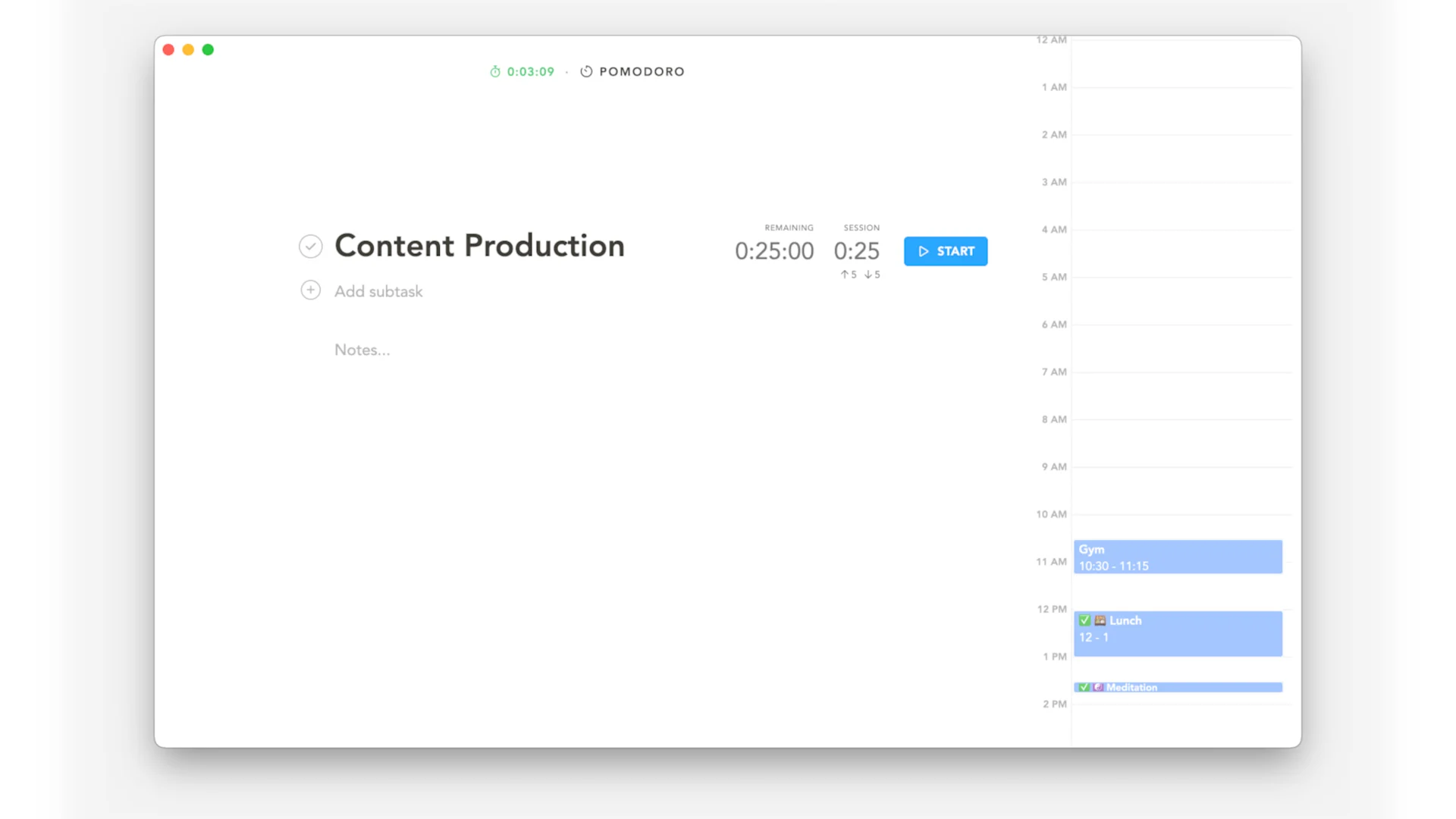
Quick Facts
- Sunsama is a mindful daily planner app focused on work-life balance.
- It works by allowing you to plan your calendar and tasks in one place.
What is Sunsama?
Sunsama is a daily planner app that lets you organize your week ahead with tasks from other apps and calendar events from popular tools like Google Calendar.
It is available on desktop (macOS, Windows), iOS, and Android. It is very popular with busy professionals who want to manage their time with work-life balance as a focus.
Is Sunsama a good Motion alternative?
Sunsama is a beautiful and easy-to-use Motion alternative.
The combination of abilities to help you do guided planning gives you a different type of app than Motion as they focus more on your mindful approaches to work than Motion does. Sunsama lacks AI abilities, which they are adding slowly, but it is lacking compared to Motion. Sunsama also has the traditional layout for adding tasks, calendar items, and even weekly objectives for more holistic approaches to planning the week.
Sunsama also has the task consolidation features you see in Akiflow, which allow you to import tasks from other apps. Many people prefer using Sunsama because it emphasizes work-life balance, which many people say Motion lacks. But regarding which tool is better, we'd suggest Sunsama for more mindful use. Motion is a more professional tool that uses AI scheduling more suitably.
Should I get Sunsama to replace Motion?
If you're hunting for something more suitable for guiding your week ahead and you want a more zoomed-out approach to work, we'd recommend Sunsama. They are similar pricing, with a light saving for Sunsama as it is $16 per month. It's worth exploring Sunsama alternatives if you're getting close in your search.
How much does Sunsama cost per month?
Sunsama costs $20 per month or $16 per month billed annually.
Plans | Pricing |
|---|---|
Monthly | $20 per month |
Annual | $16 per month |
Is Sunsama Free?
Sunsama does not have a free plan outside of the 14-day trial.
Recommendation
Reclaim AI
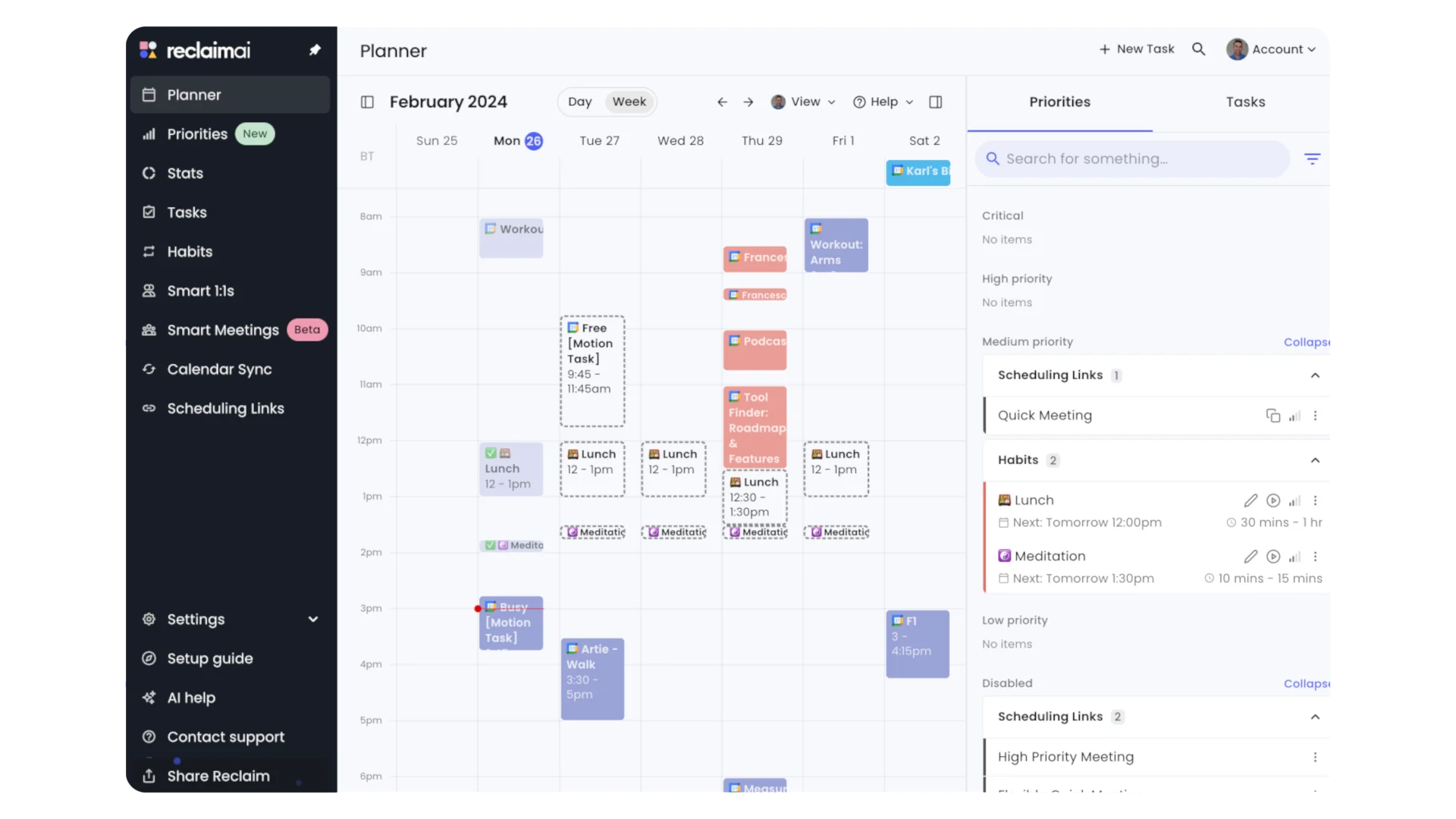
Quick Facts
- Reclaim is an AI calendar management tool owned by Dropbox.
- It allows you as a team to manage your meetings, habits & time using AI.
What is Reclaim AI?
Reclaim AI is an intelligent calendar tool popular with teams and busy professionals.
It is a scheduling tool for teams and busy professionals to reclaim their calendar management. Dropbox now owns it. Reclaim AI works with Google Calendar and on the web. It is most used by teams.
Video Tutorial: Reclaim AI Review (2024)
Is Reclaim a good Motion alternative?
Reclaim is more designed for team-based scheduling, but does serve as a good Motion alternative as a way to plan your schedule using priorities, and even re-scheduling using AI Motion does well. Reclaim aims to handle tasks, habits, calendar, and time tracking with a calendar-first focus, versus Motion which focuses more on the task first.
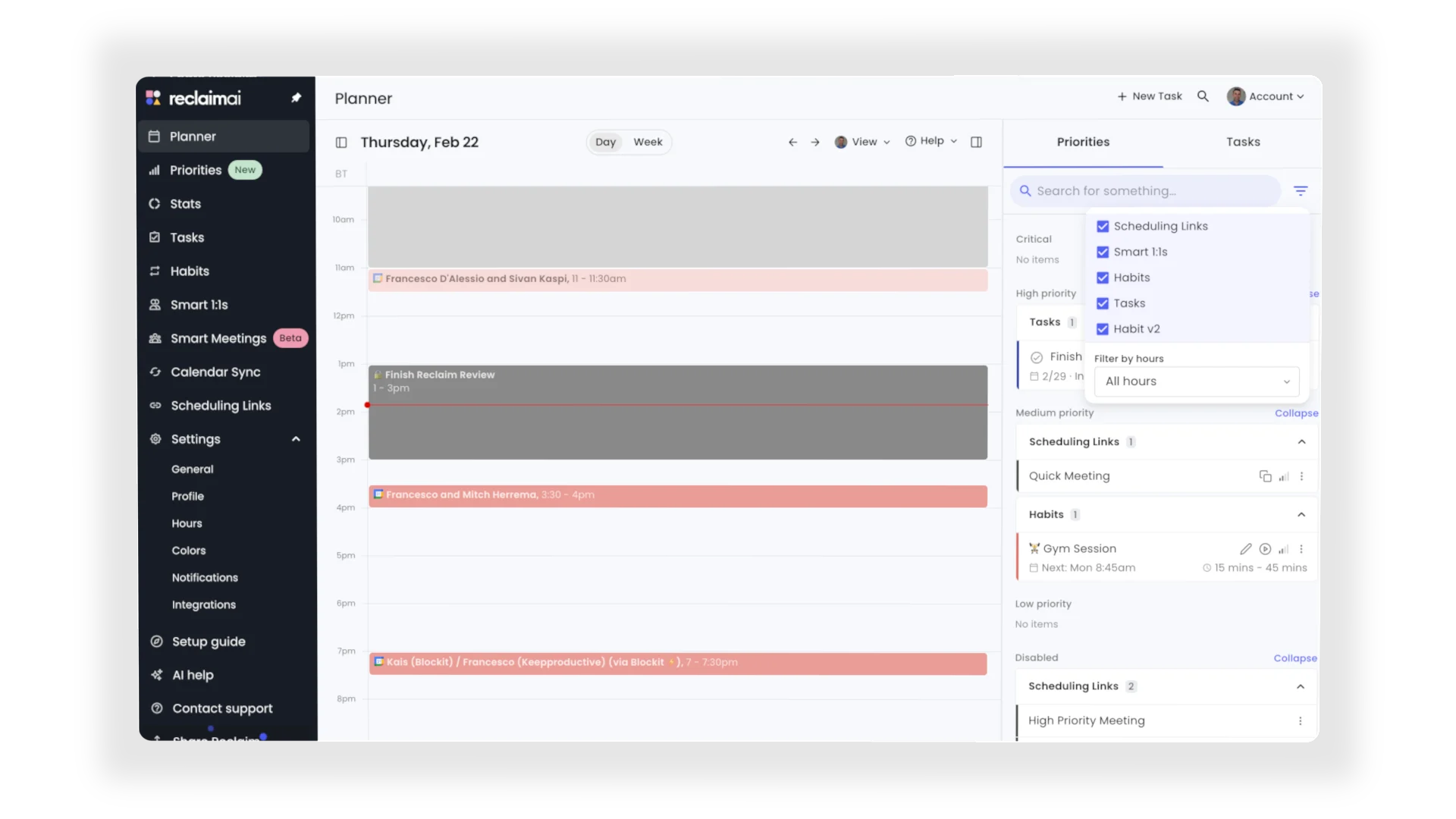
Is Reclaim AI better than Motion?
Motion is better for task and project management and feels more like a to-do list app. Whereas Reclaim feels more focused on calendar management and is a powerful extension of Google Calendar that allows you to handle all aspects of your calendar management.
There are features like habits that make Reclaim a great way to handle individual routines and 1:1 smart meeting scheduling. Overall Reclaim acts more like a calendar power tool than Motion's task management focus.
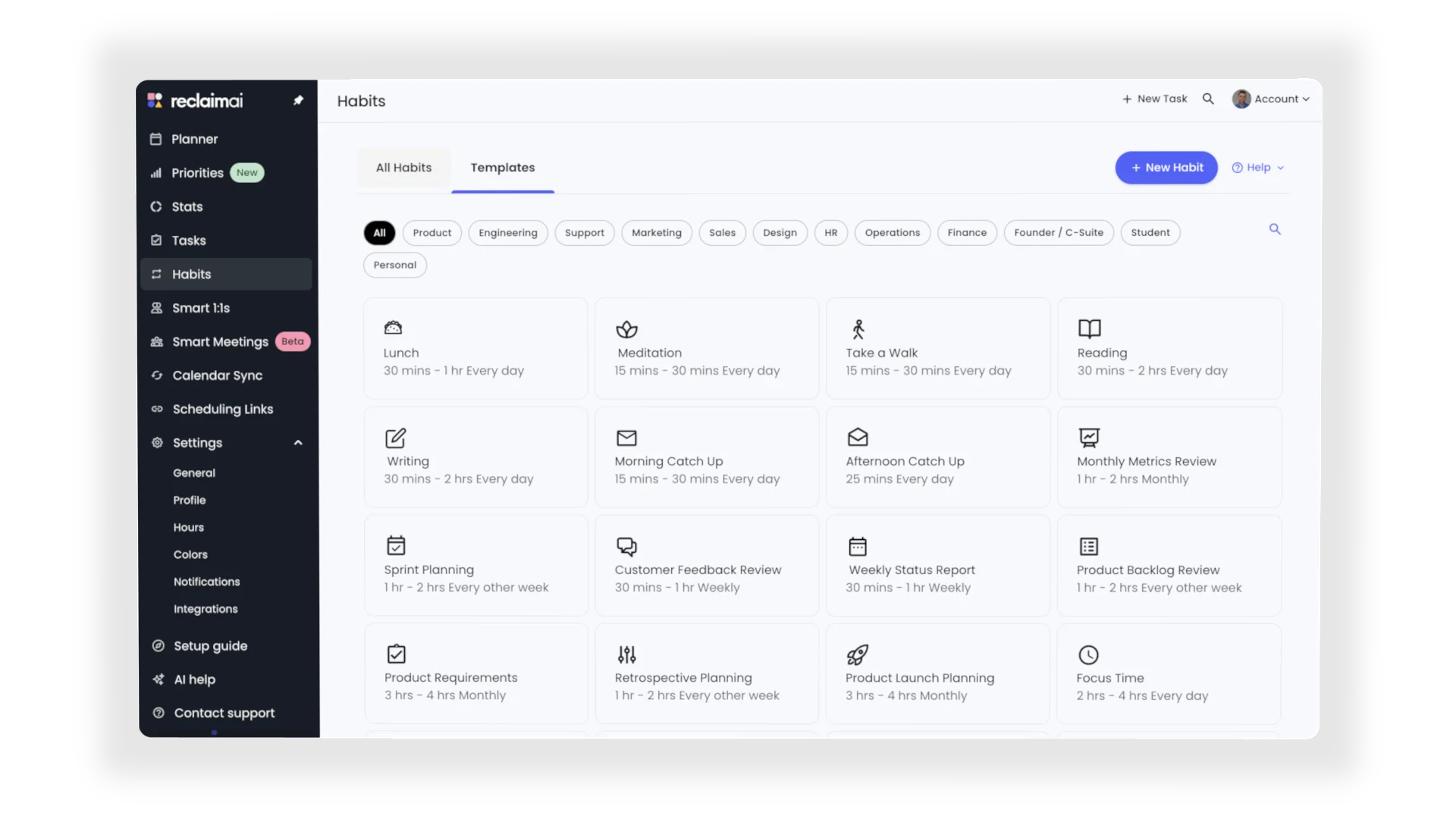
Should I get Reclaim to replace Motion?
If you're hunting for something more calendar-centric, open to sharing with team members, and use Google Calendar only, Reclaim has some powerful AI abilities that are growing rapidly to help better focus your calendar ahead.
How much does Reclaim AI cost per month?
Reclaim AI has a range of pricing options for individuals and teams:
Plans | Pricing |
|---|---|
Basic | Free |
Starter | $8 per month |
Business | $12 per month |
Is Reclaim AI free?
Reclaim offers a free plan with limited features for individuals.
Recommendation
Routine
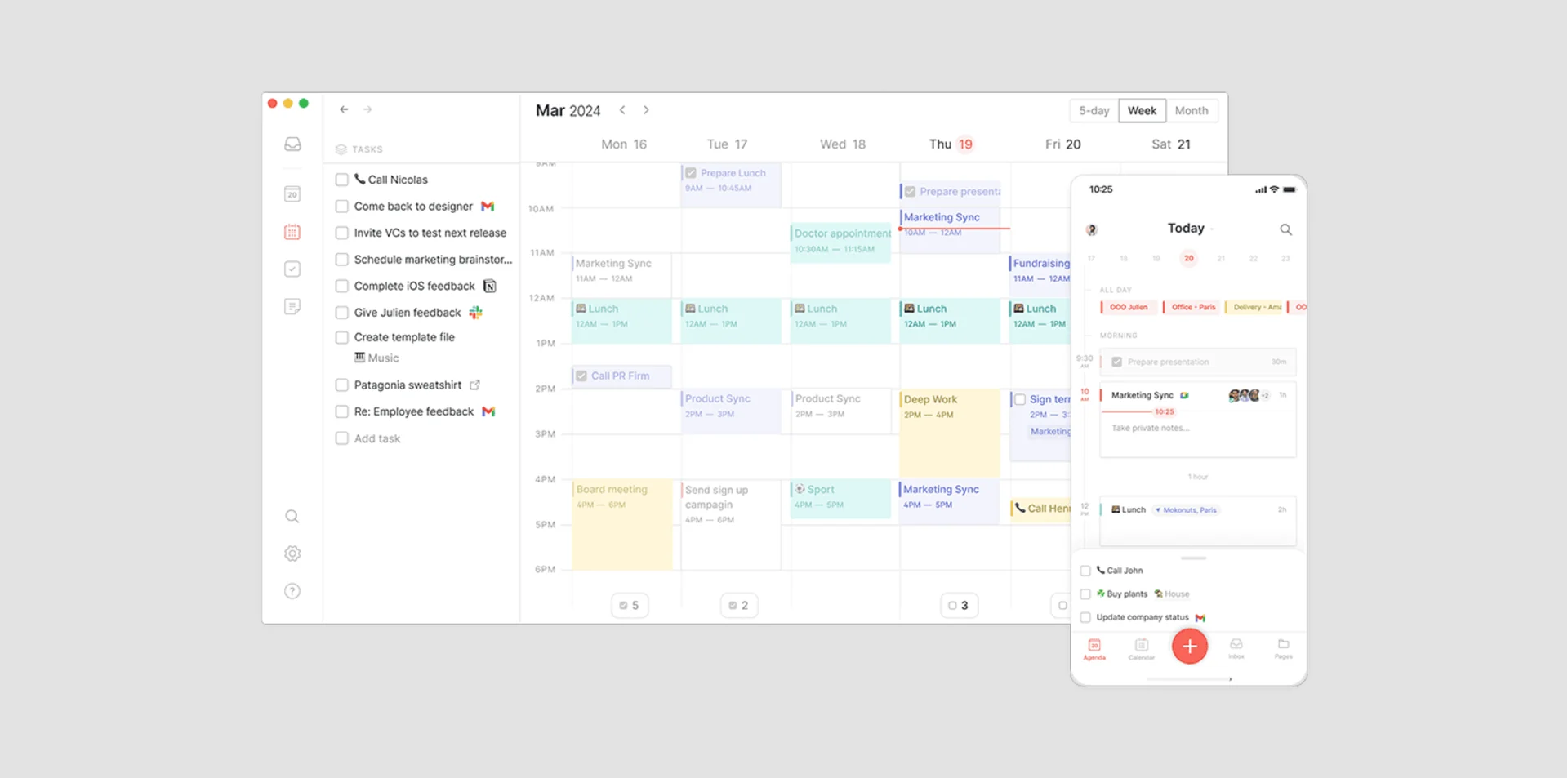
Quick Facts
- Routine is popular with busy professionals.
- It helps you manage your week, tasks, and calendar events.
What is Routine?
Routine is a daily planner app for planning tasks, calendars & light note-taking.
It wants to help you manage aspects of your planning and has project management abilities for small teams. It is available for planning tasks on macOS and Windows.
Is Routine a good Motion alternative?
Routine is one of the most minimal daily planner apps.
It works by allowing you to connect your calendar, organize your tasks, and capture notes too, but compared to Motion it won't have AI abilities for handling re-scheduling, or meeting scheduling abilities. Whilst Routine will help you manage your day, it will do it more manually than the other tools on this list.
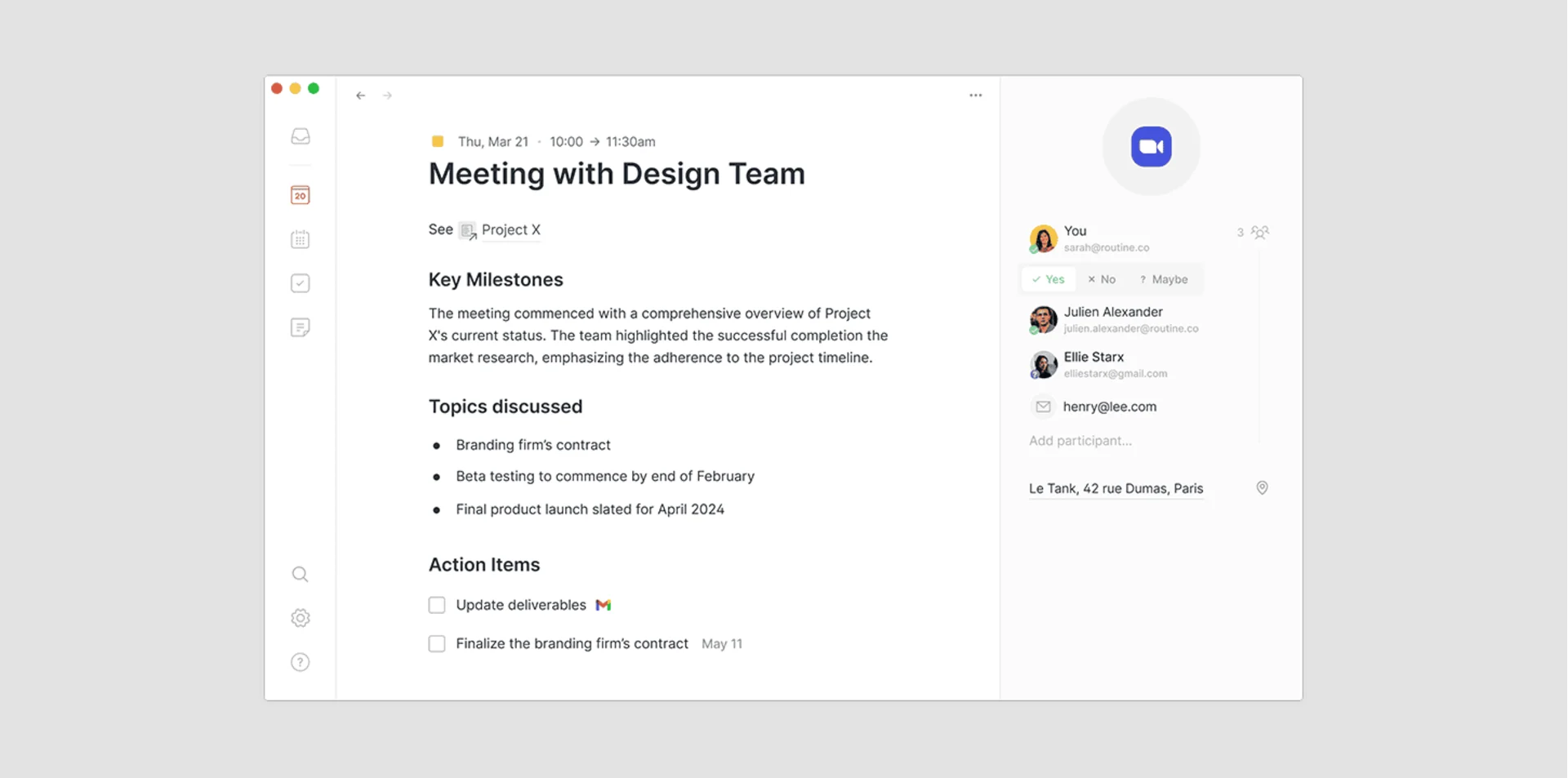
It makes for a good Motion alternative if you're someone who likes something that is more manual for planning and comes with light note-taking too.
Should I get Routine to replace Motion?
If you're hunting for something that handles notes, want something good-looking for tasks and calendar, and are worried about how much Motion costs, then Routine is a much more approachable option that costs around 30% less than Motion.
This is popular with busy professionals who want something more than Todoist.
Video: Routine App Review
How much does Routine app cost per month?
Here's how Routine is priced:
Plans | Pricing |
|---|---|
Basic | Free |
Pro Monthly | $8 per month |
Pro Yearly | $10 per month |
Is Routine free?
Routine does come with a limited free subscription.
What is ClickUp?
ClickUp is project management software with collaboration, task management, whiteboards, documents, and chat features. It is a popular tool for managing all your projects in one place.
ClickUp works on Windows, macOS, Linux, Chrome, and the web and has iOS and Android apps.
Is ClickUp a good Motion alternative?
ClickUp is a good alternative to Motion if your goal is project management.
Motion has project management abilities like Kanban boards and table views for planning. Motion is also set to get timeline mode, but Clickup has a lot of views like dashboards, chat, tables, Gantt chart views, and much more which give you and a small team, even a large team, a much more effective opportunity to want to handle projects in a more structured manner.
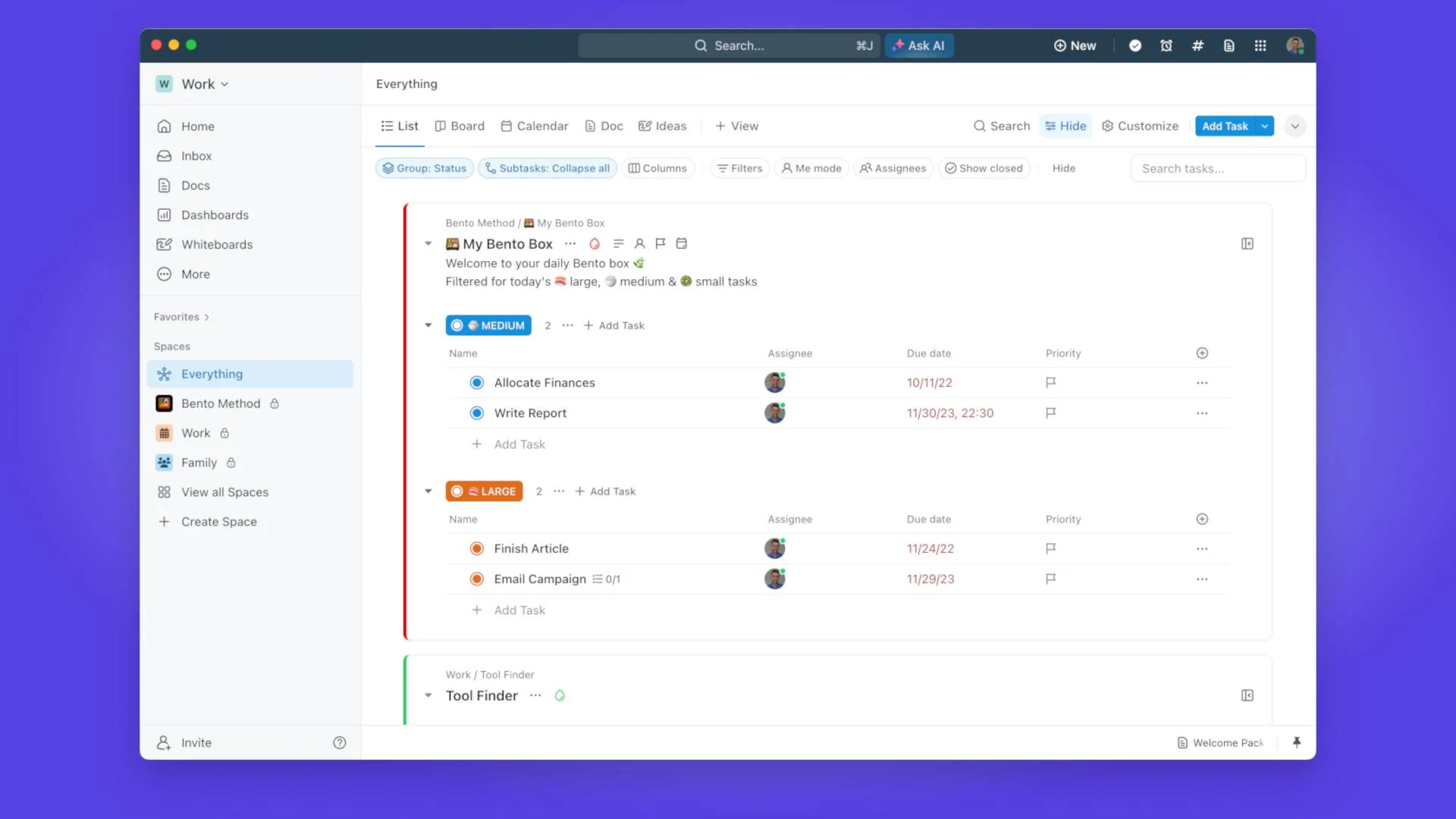
ClickUp is a good replacement for Motion if you assign tasks to others.
Is Motion like ClickUp?
Motion and ClickUp are similar, Motion focuses more on task management with AI abilities for re-scheduling which ClickUp doesn't have in that capacity. ClickUp is more of a project management tool that helps you handle small to large teams.
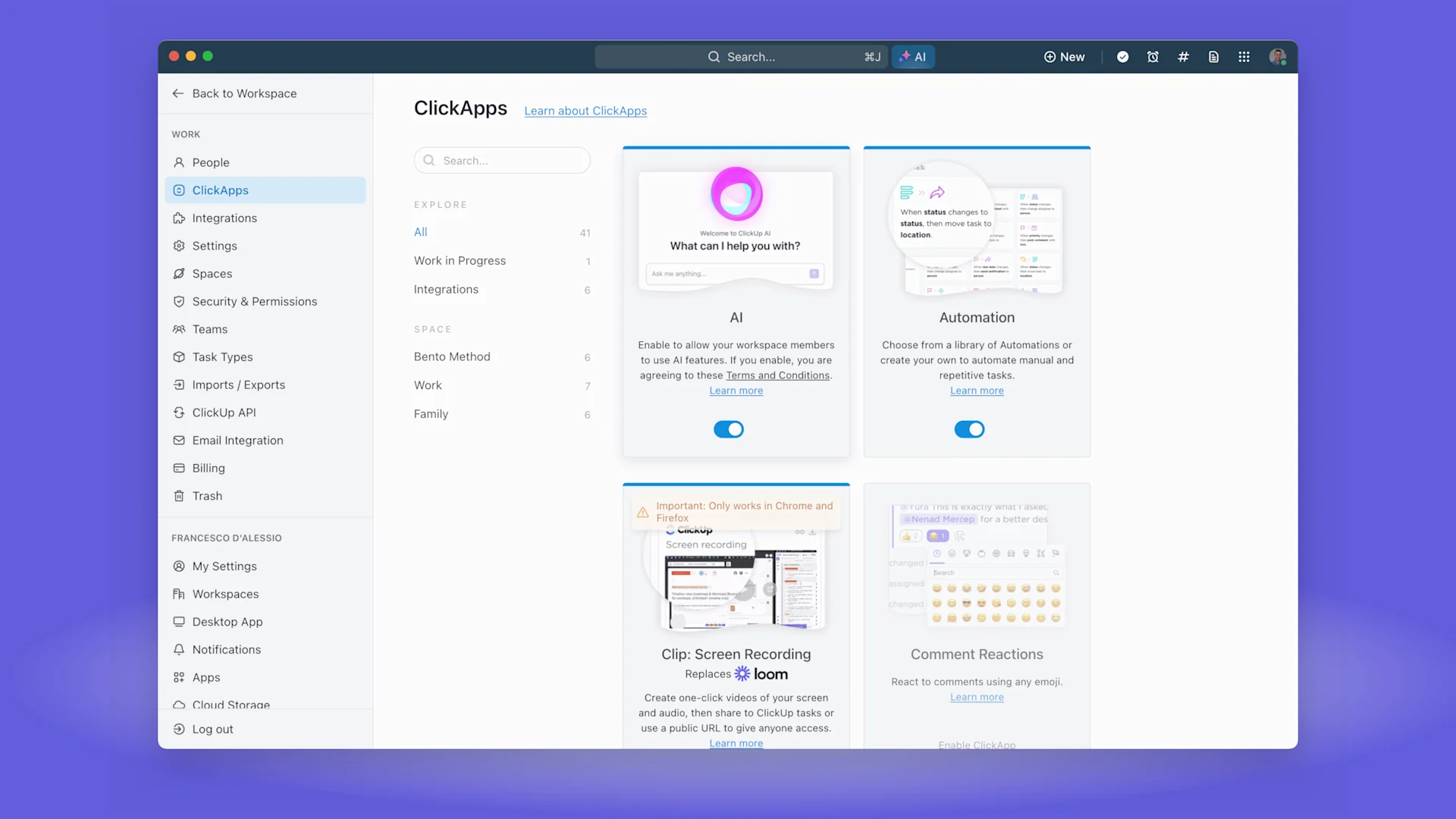
Should I get ClickUp to replace Motion?
If you're looking for something more project management-focused, has a generous free solo plan, and wants your views to be more expressive, ClickUp is a brilliant alternative to Motion.
How much does ClickUp cost per month?
ClickUp has a generous free plan and premium options for teams:
Plans | Pricing |
|---|---|
Basic | Free with limits |
Unlimited (Annual) | $7 per month |
Business (Annual) | $12 per month |
Is ClickUp free?
Yes, ClickUp offers a free plan with limits like 100MB of storage per workspace.
What is Superlist?
Superlist is a collaborative to-do list application for individuals and teams to manage lists and tasks. They can be captured and organised into your daily to-do list. Superlist works on iOS, Android, web, and macOS.
How much does Superlist cost per month?
Superlist has a free plan and a paid pricing scheme for individuals & teams:
Plans | Pricing |
|---|---|
Basic | Free |
Individuals Annual | $8 per month |
Teams Annual | $10 per month |
Is Superlist free?
Superlist is free to use but comes with limits.
Is Superlist a good Motion alternative?
Superlist is a to-do list application designed for individuals and teams.
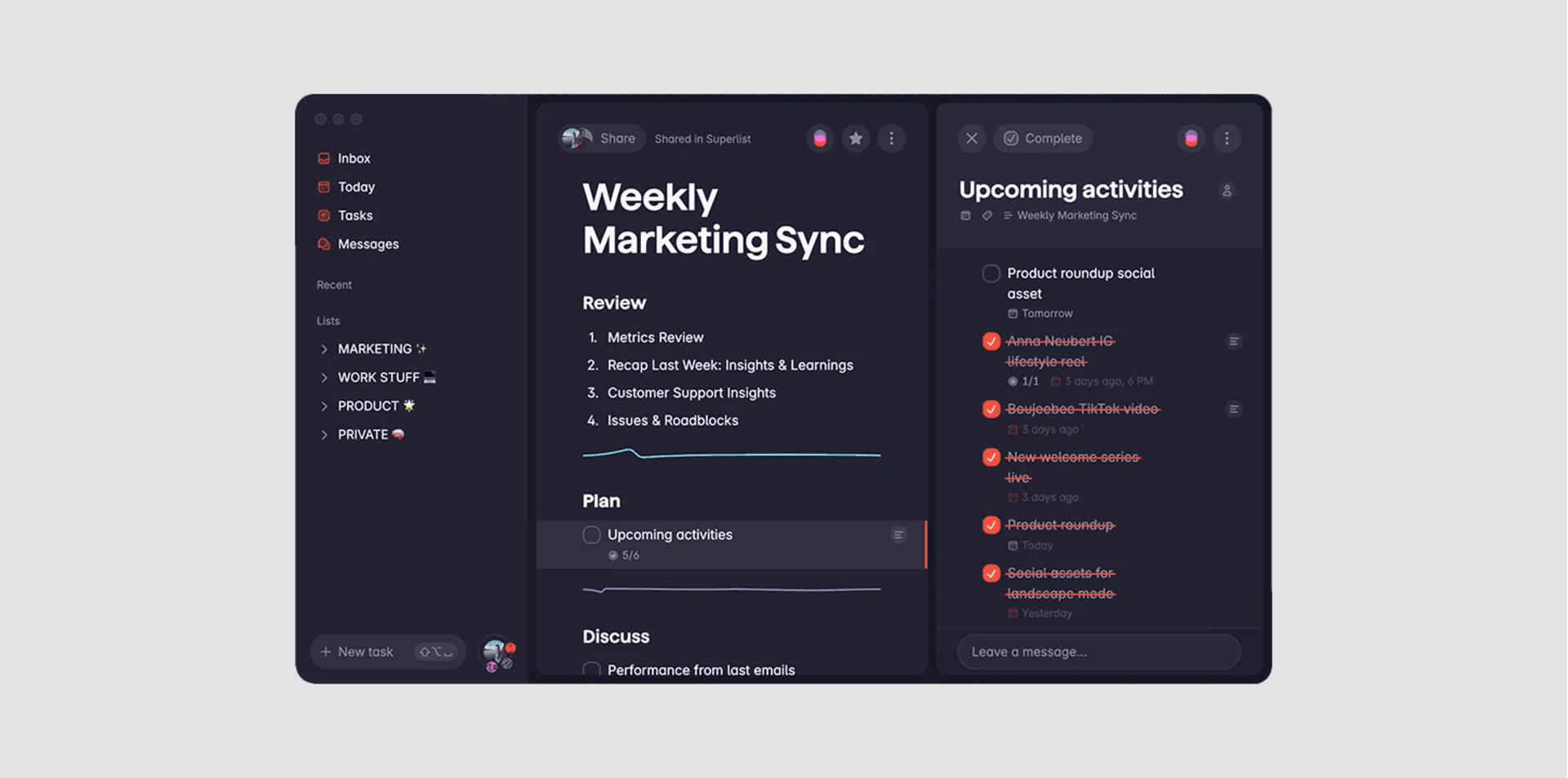
Much like Motion, it can be used in both capacities for teams and for solo users, Superlist doesn't have any power AI features for re-scheduling but they do have an AI feature called Make that can help enhance the notes you take using gen-AI.
Largely people tend to use look at Superlist if they want to start organizing tasks and notes with others, which is something you cannot do in Motion, but it does come as a good replacement to Motion.

Should I get Superlist to replace Motion?
Superlist is much more suitable if you want something more manual for tasks, want to collaborate on project-based notes together, and lower pricing too. Superlist is one of the better collaborative tools for managing tasks together in a to-do list layout, whereas Motion is much better as a daily planning app.
Recommendation
Todoist
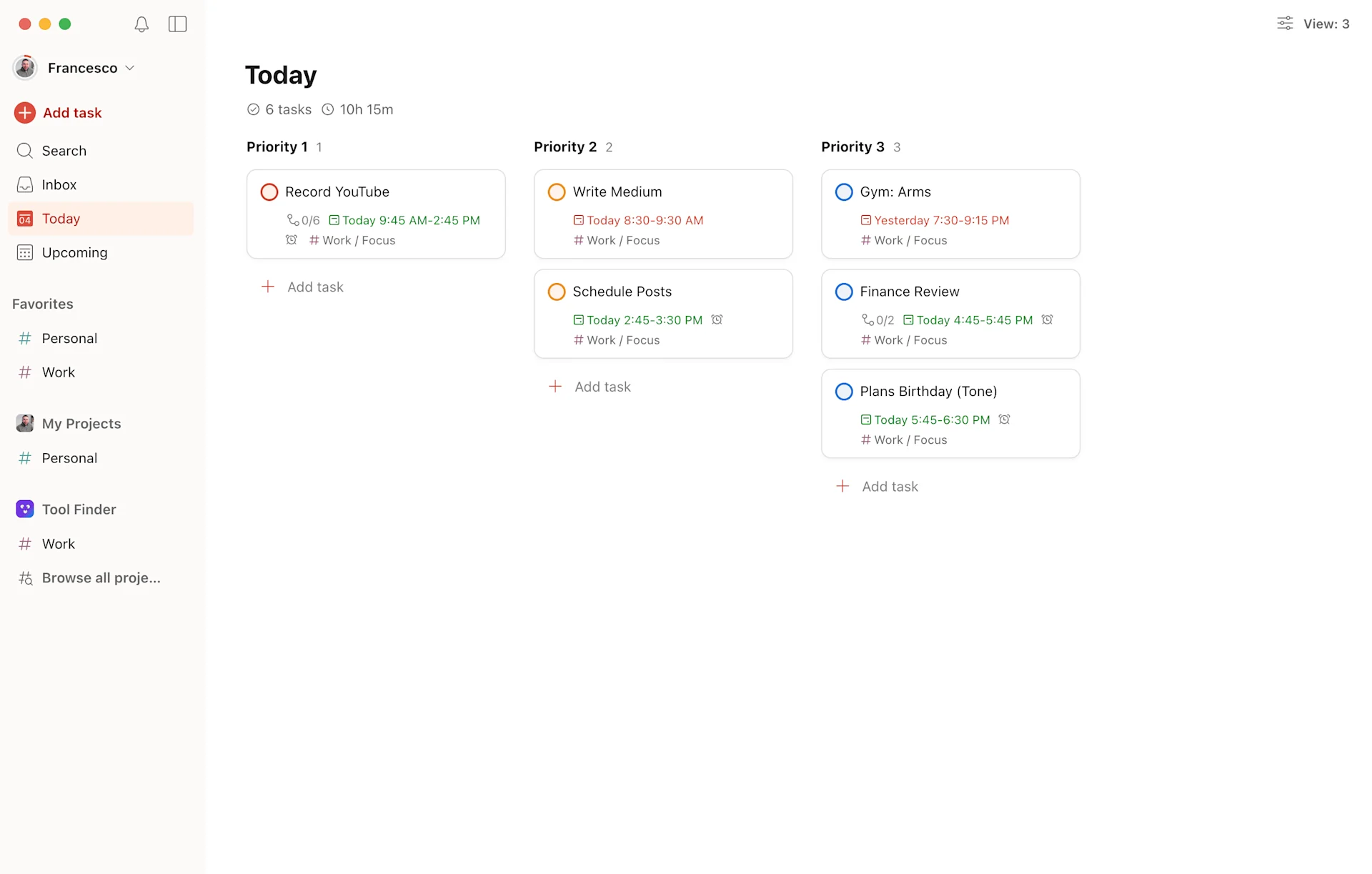
Quick Facts
- A long-standing to-do list application.
- Easy tool for planning tasks and calendars in one.
- Comes on most devices like macOS, iOS, Android, web & Windows.
What is Todoist?
Todoist is a task management app for iOS, Android, macOS, and Windows. Millions use it to manage tasks and reminders, add calendar events, and organize daily schedules.
Todoist allows you to organize tasks in Kanban boards and calendar view and includes quick capture abilities for on-the-go capture of tasks, links, and ideas. Teams use it with a dedicated team workspace experience for small-to-medium-sized teams.
Is Todoist a good Motion alternative?
Todoist is a reliable to-do list application and a good alternative to Motion.
Motion offers more AI abilities and power features like booking meetings that will save you using tools like Calendly for booking meetings and even some better project management abilities, all features that Todoist lacks.
Todoist is a good value alternative to Motion and brings around 60% of the features you get in Motion, but lacks those more advanced features that those busy individuals will benefit from.
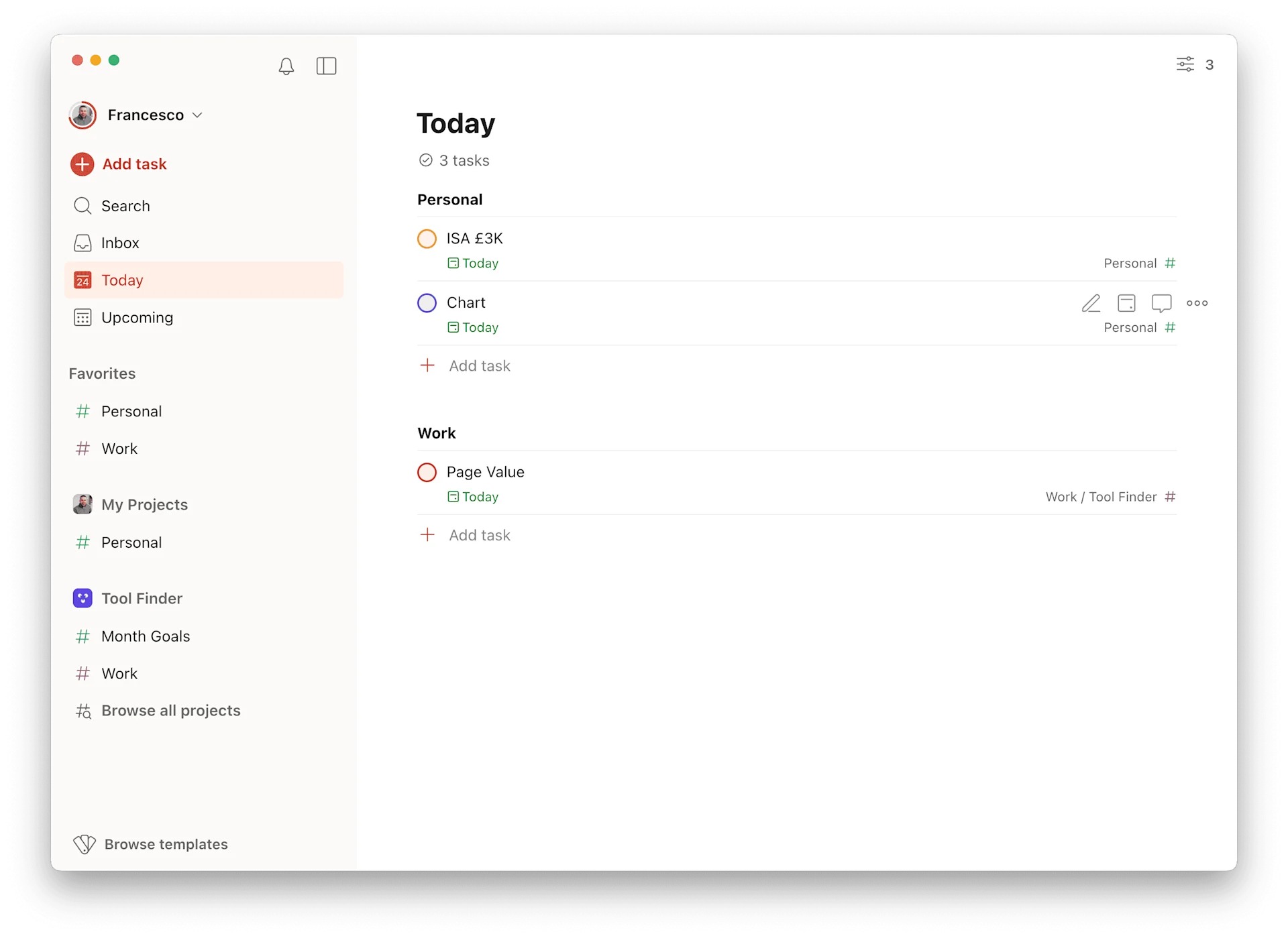
What are the differences between Motion and Todoist?
Motion is a daily planner app that combines calendar, AI rescheduling, and task management. Todoist presents more of a task management focus, with a planned calendar mode to help handle tasks, but Motion is very much an advanced to-do list experience and daily planner app for busy professionals.
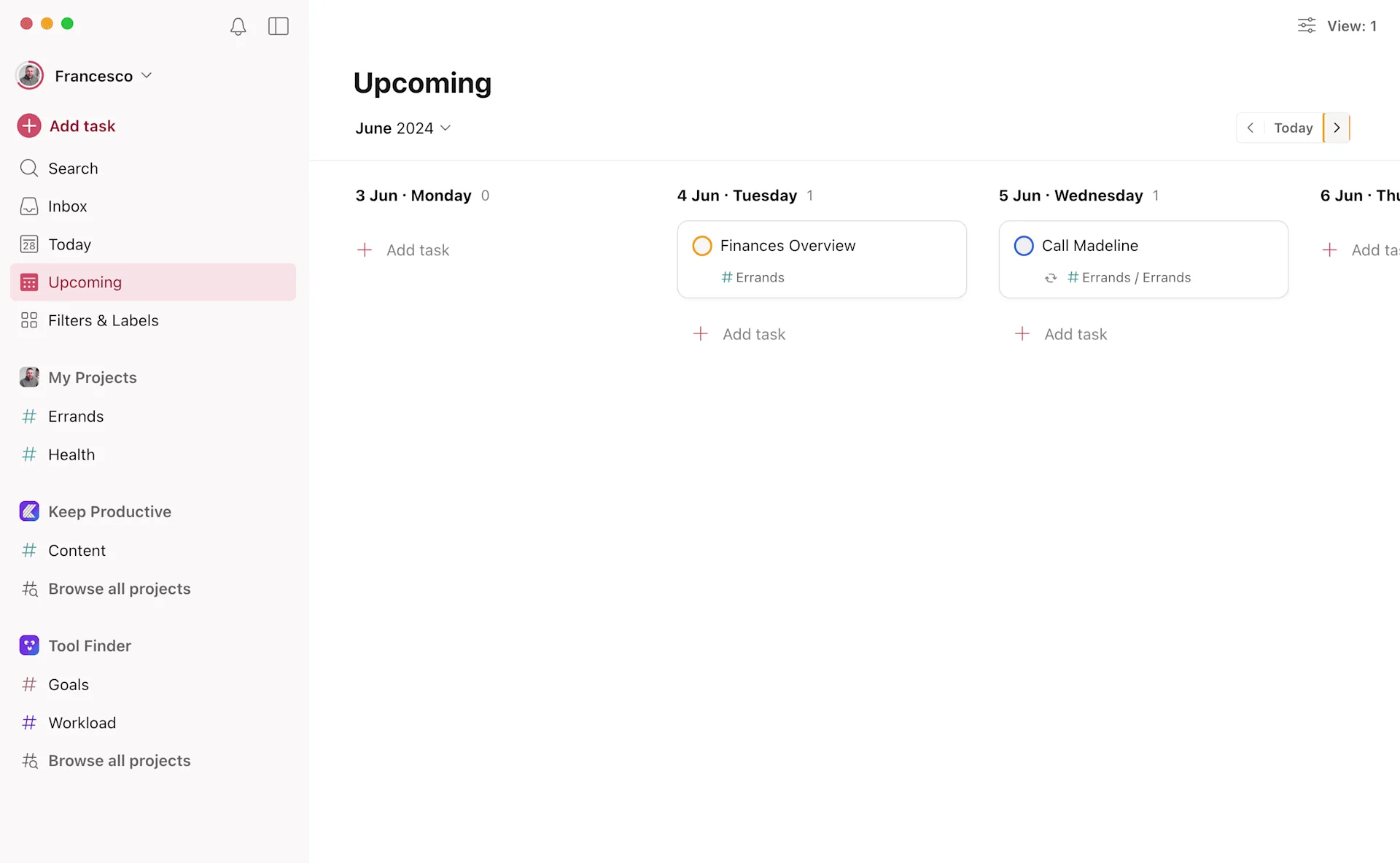
Should I get Todoist to replace Motion?
If you're looking for something more cost-effective with Todoist being considerably cheaper than Motion, something lighter in nature for your task management, and comes with a handful of good views like board, calendar & list view, then Todosit is a good option.
How much does Todoist cost per month?
Todoist has a few pricing options for individuals and teams:
Plans | Pricing |
|---|---|
Beginner | Free |
Pro (Annual) | $4 per month |
Business (Annual) | $6 per month |
Is Todoist free?
Todoist offers a free plan with five personal projects & unlimited tasks.
Pricing Breakdown
How do Todoist & Motion compare on pricing?
Here's the breakdown of how they compare to each other:
Plans | Todoist | Motion | Year Total |
|---|---|---|---|
Basic | Free | No Free | NA |
Individual (Annual) | $4 per month | $19 per month | $48 vs $228 |
Individual (Monthly) | $5 per month | $34 per month | $60 vs $408 |
Team (Annual) | $6 per month | $12 per month | $72 vs $144 |
Team (Monthly) | $8 per month | $20 per month | $96 vs $240 |
What is Timestripe?
Timestripe is a daily planner app designed to manage tasks & calendars in one.
It is popular for long-term planning as you can open tasks in day, week, month, year, and 5-30-year views. Many people find this perfect for co-ordinating focus for goal planning. It comes on a range of devices.
Is Timestripe a good Motion alternative?
Timestripe is an interesting alternative to Motion as it focuses on the goals of life.
Motion wants you to handle your tasks day to day and your project management too, using the power of AI, whereas Timestipe wants you to better think of your month and year goals to help you align what you're working on ahead. So as a Motion alternative, it is a better one for those people who want to plan with goal tracking and goal planning in mind. Many people fall in love with the unique approaches of Timestripe.
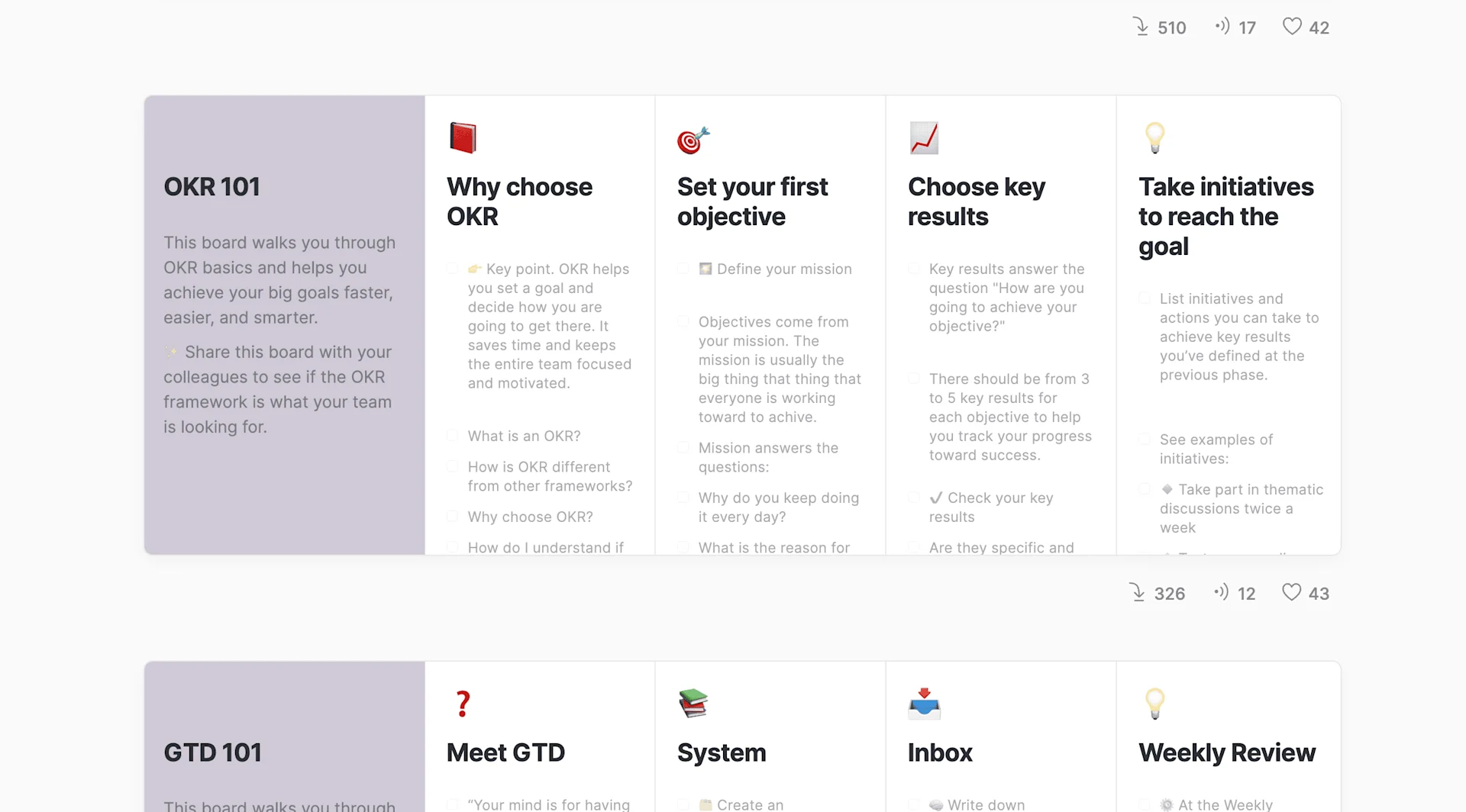
Tiemstripe doesn't have any AI abilities and Motion has much better project management abilities although inside Timestripe you can add boards and plan them with others.
Should I get Timestripe to replace Motion?
Timestripe is cheaper, focused on goal-planning, and doesn't have any AI, but it does think more holistic about how you plan your goals and pushes you to think more about the 50,000 ft view and system that will better help you plan work.
How much does Timestripe cost per month?
Timestripe has a range of options for pricing to help save money:
Plans | Pricing | Included |
|---|---|---|
Basic | Free | Limited access |
Monthly | $15 per month | All Pro features |
Yearly | $7.50 per month | All Pro features |
5-yearly | $300 total | All Pro features |
Is Timestripe free?
Timestripe has a free plan with limited features and limits on the amount of access.
Recommendation
Amie Calendar
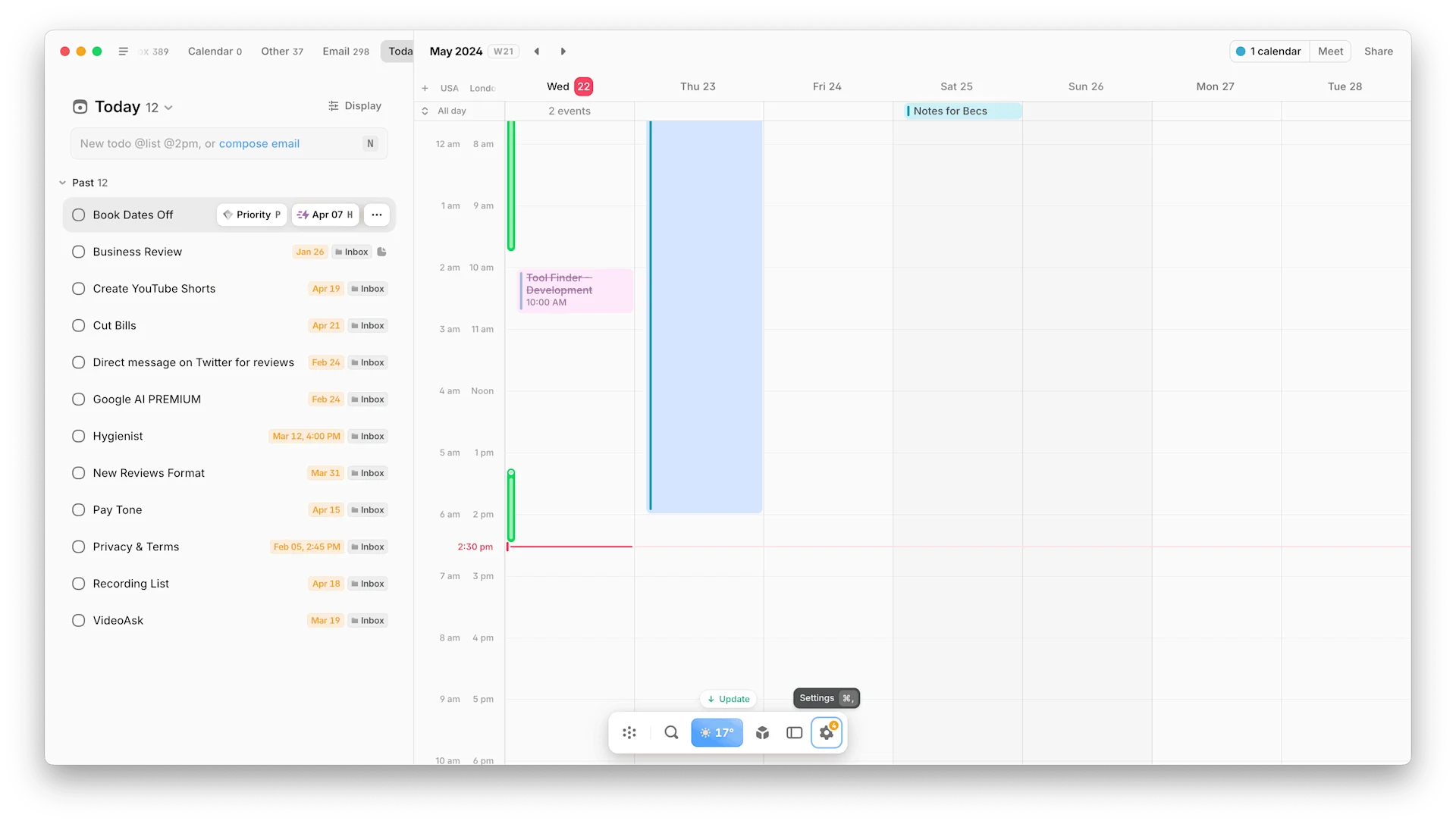
What is Amie?
Amie is a calendar app with tasks and email management. It is available on the web, iOS, macOS, and Windows and is coming soon to Android.
It allows you to time-block your events and tasks, manage your workload in inbox views, organize meetings with a sharing link & on a premium subscription, and handle emails.
Is Amie a good Motion alternative?
Amie isn't the most obvious Motion alternative but comes with good task integrations to apps like Todoist, Linear, Notion & more and allows you to handle your calendar events with Google Calendar all in one.
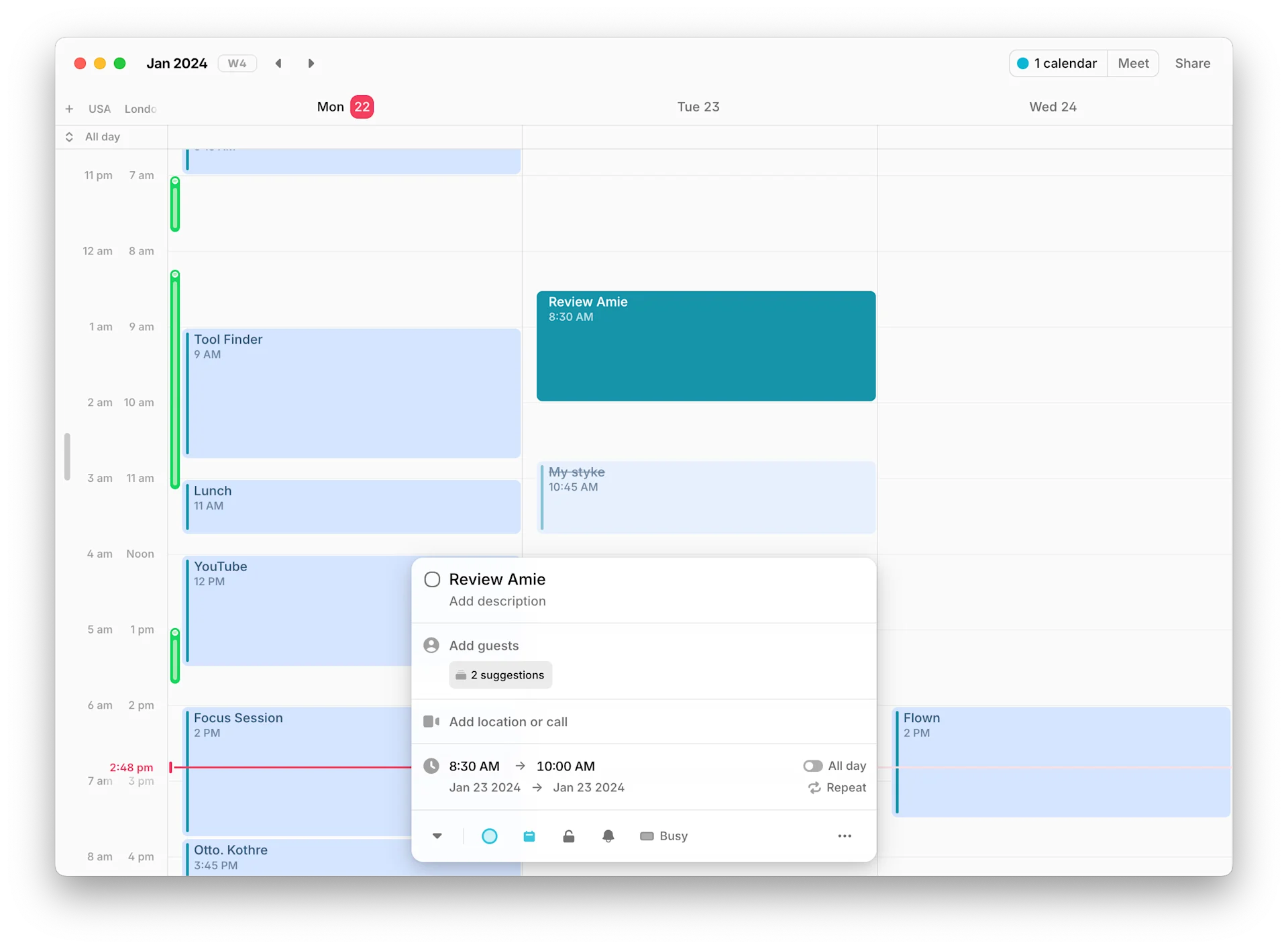
This is a calendar app at heart, but in the premium, Amie offers a way to bring in your emails from your Gmail or Google Workspace accounts which makes for a unified way to handle emails as a task in your system. As a Motion replacement, Amie is an interesting option that seems to growing fast and has a powerful iOS app for handling tasks & events.
Should I get Amie to replace Motion?
If you're hunting for a more calendar-focused experience, like to time-block your tasks or want something very mobile-friendly, Amie is a good replacement for Motion. Amie comes for $15 per month (monthly) and comes with those email abilities.
How much does Amie cost per month?
Amie does come with free & premium pricing options:
Plans | Pricing | Included |
|---|---|---|
Pro Annual | $19 per month | Unlimited access |
Is Amie free?
No, there is no free plan (updated September 2024).
TickTick
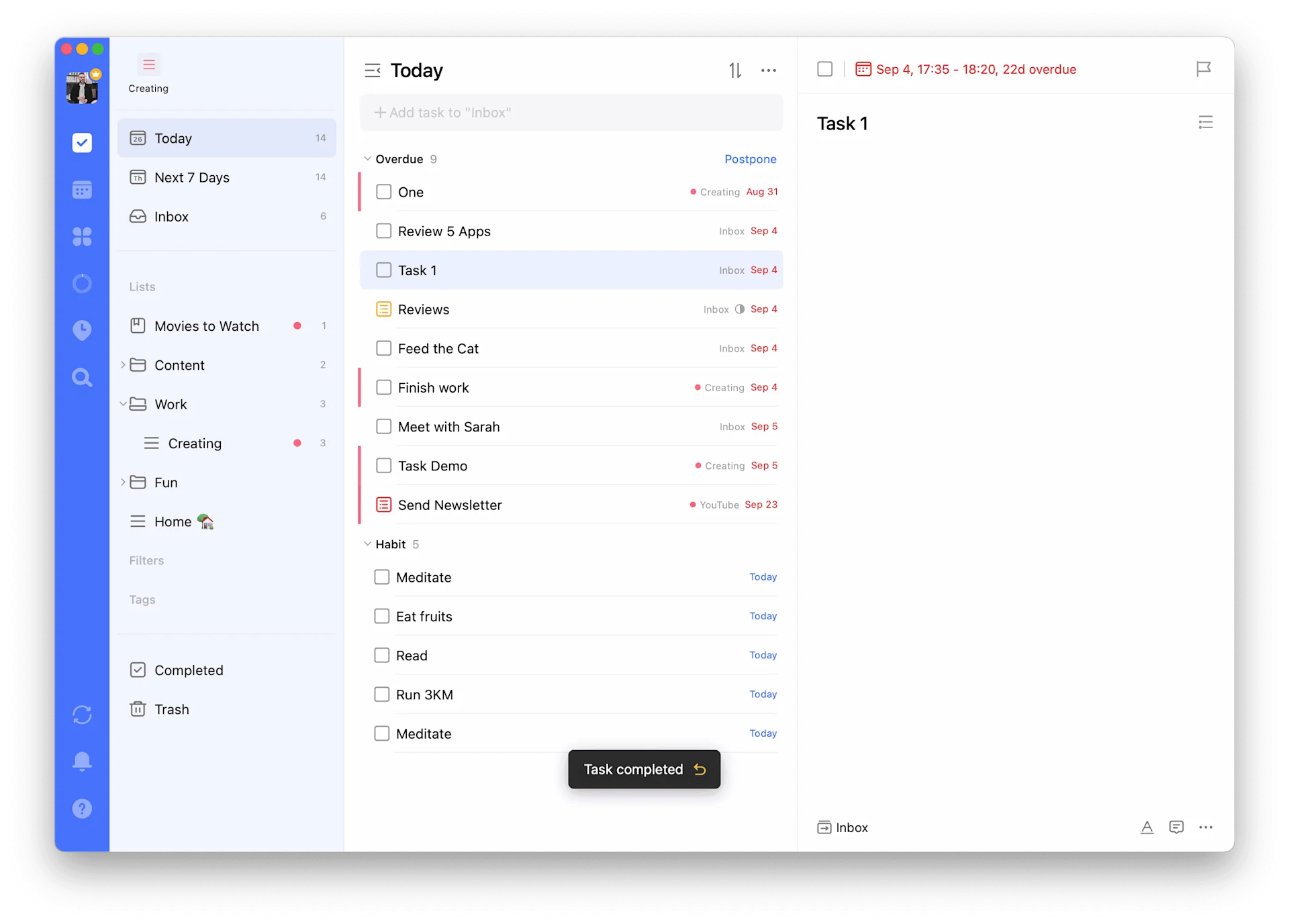
What is TickTick App?
TickTick is a task management app designed for individuals. It also has boards, a calendar, timers, an Eisenhower matrix, and a habit-tracking system.
It uses iOS, Android, macOS, web, and Windows for task management.
How much does TickTick cost per month?
TickTick has only two pricing options to consider for users:
Plans | Pricing | Included? |
|---|---|---|
Basic | Free | Limits |
Premium Monthly | $3.99 per month | All features |
Annual | $35.99 per year | All features |
Education | $26.99 per year | All features |
Is TickTick free?
TickTick is free to use with limits.
Is TickTick a good Motion alternative?
TickTick brings a good series of features for task management.
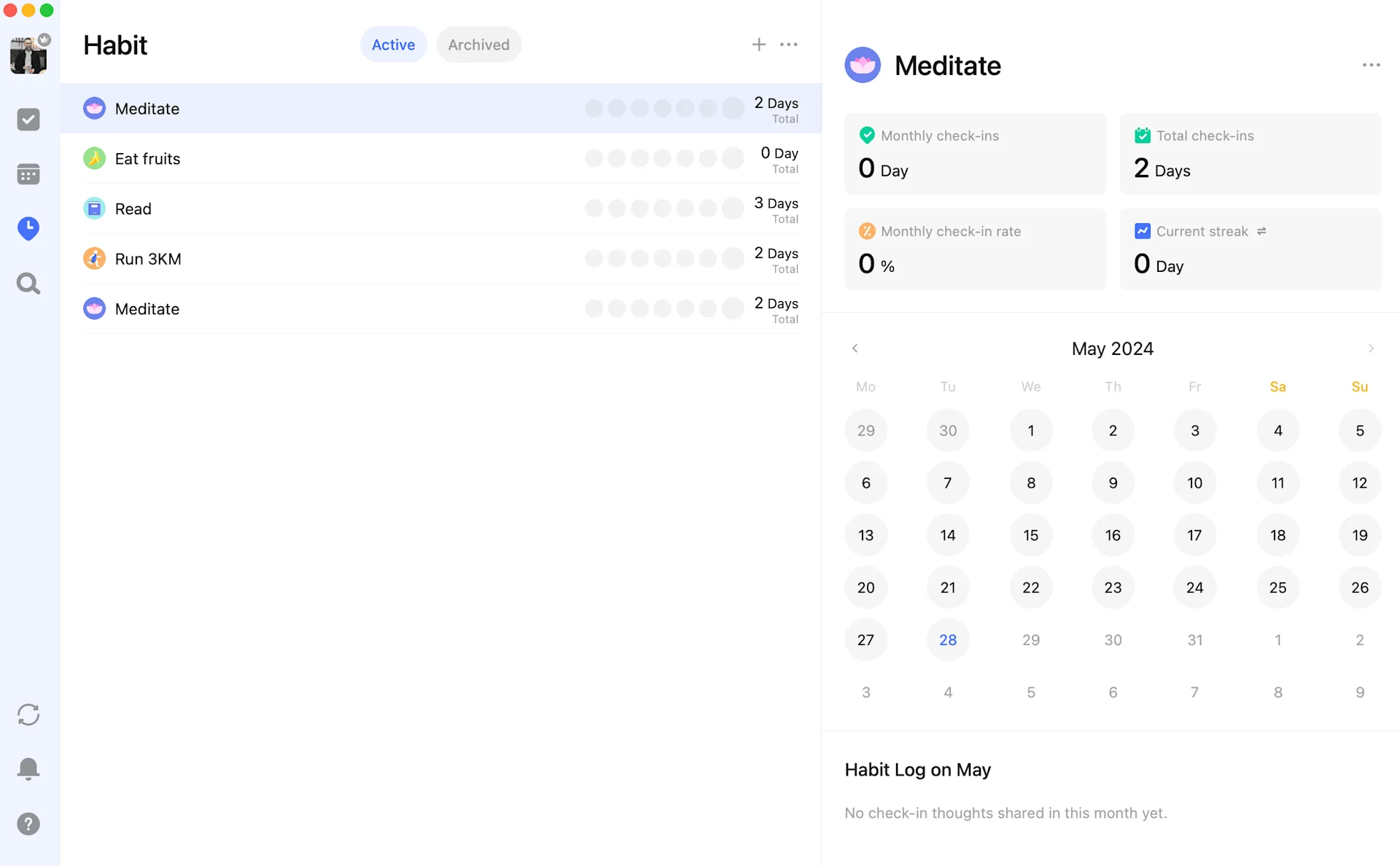
Handling habits, timeline view, and calendar modes all in the TickTick premium give TickTick a good experience for those looking for something lighter than Motion but with the powerful views that you get in Motion. It won't allow you to handle re-scheduling with AI or the meeting booking abilities, but it does have a Google Calendar 2-way sync they recently added to the calendar mode for better and more effective planning of your calendar.
TickTick is one of the better value to-do list apps on the market.
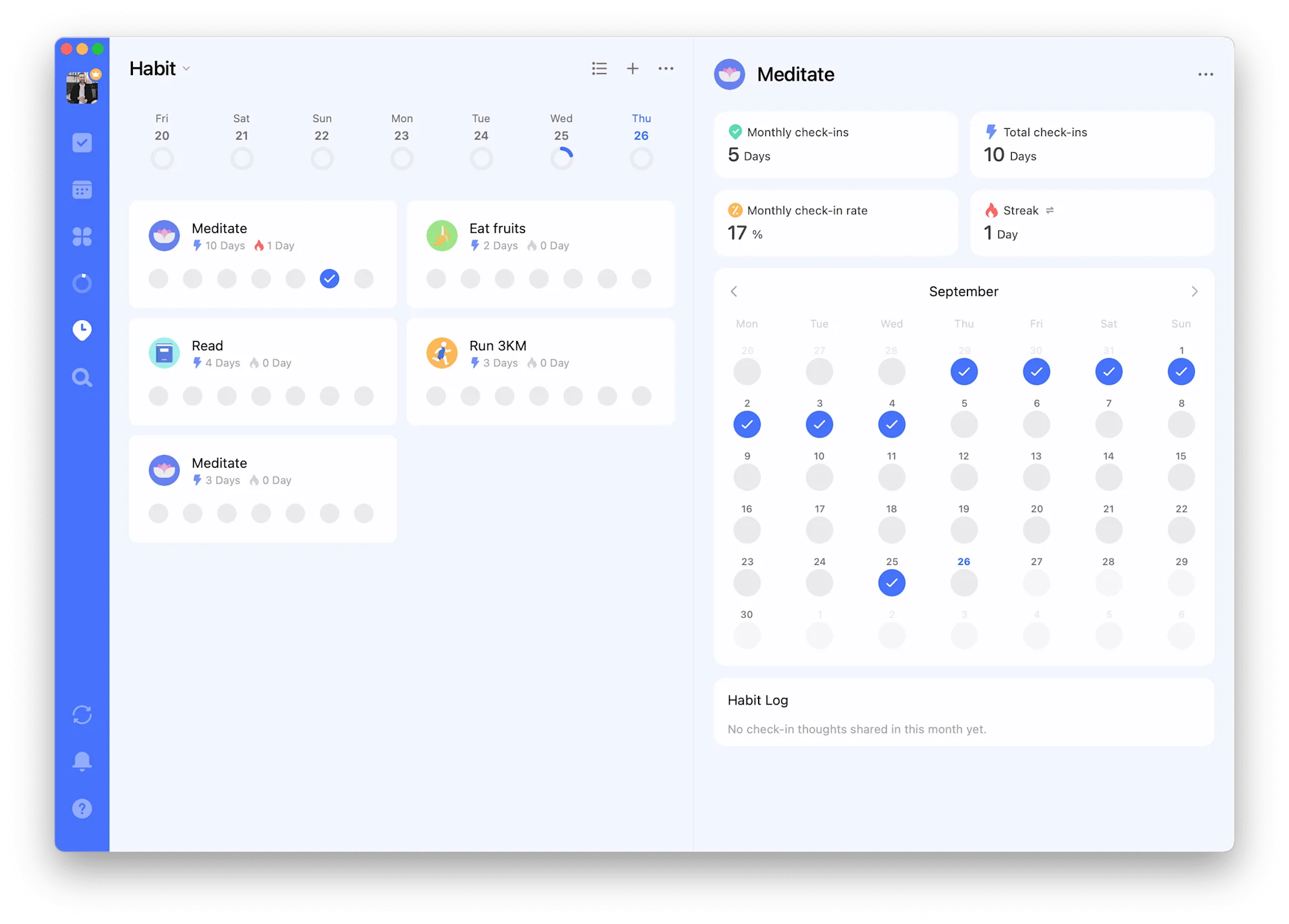
Should I get TickTick to replace Motion?
If you're hunting for a Todoist-like app, that has a lower budget than Motion, comes with calendar mode already, and helps you to plan your day with an easy-to-customize layout, then TickTick is a good replacement for you with Motion. People tend to fall in love with the way you can handle tasks in TickTick alongside habits and calendar events.
Help me pick a Motion alternative
Let's help you narrow down the tools and options further for your specific needs:
What is the best Motion alternative for iOS?
Todoist and Structured both have good iOS apps that could be good replacements for Motion that will allow you to plan your day, maybe not in the same manner and as intense for daily planning and with AI, but they work for iOS well as an alternative.
What is the best Motion alternative for project management?
ClickUp is the best Motion alternative that focuses more on the project management and organization aspects. It has a solo user plan and comes with the ability to add members. Whilst Motion is good for a small set of users for project management, many people recommend tools like ClickUp as a more advanced way to handle projects than Motion.
What is the best Motion alternative for macOS?
Routine is brilliantly crafted for macOS as a Motion replacement with a feature called Console that allows users of Routine to capture tasks, calendar events, and notes quickly into the system, which allows for fast and easy capture of tasks.
What is the best Motion alternative for students?
Students looking at Motion might find it expensive for their budgets when at university or college, so we'd recommend looking at TickTick, Zinnia, and Todoist. Zinnia is a visual planning tool that will be more cost-effective but allow you to plan your week ahead.
What is the best Motion alternative for ADHD?
Those with ADHD will find that Marvin could be a good replacement for Motion as it helps to plan your day using plug-and-play tools that people might like to use for switching the tools they'll use the most and remove the tools that don't matter to them.
We'd recommend exploring these ADHD daily planner apps for a better choice.
What is the budget-friendly Motion alternative?
If you're looking to get something like Motion without the larger costs of $19 per month, then TickTick or Reclaim could be good alternatives, both offering generous free plans.
How to get Motion for free?
Getting access to Motion is limited to the 14-day free trial and you can find that here. Motion has no free subscription meaning you cannot get access free.
Is Evernote a Motion alternative?
Evernote is one of the better note-taking apps, but it recently has allowed for tasks and calendar one experience aiming to make more of a planner-like app, but right now it is not a good Motion alternative. If Evernote is not for you, these Evernote alternatives will help you better choose a more suitable alternative.
Recommended Reads
Similar to your current reading interests:
Oops, undefined is still in development...
Weekly Roundup: Explore People's Productivity Tools
Become a reader to our newsletter exploring what productivity apps people use on a daily basis to get things done

